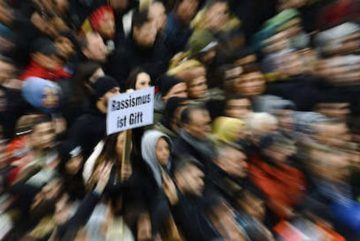Kenan Malik in Pandaemonium:
 ‘Hate is a poison that… is responsible for far too many crimes’, said the German chancellor Angela Merkel after the killing of nine people in a far-right terror attack on two shisha bars in the German town of Hanau last week. ‘This is neither rightwing nor leftwing terror, it’s the crazy act of a deranged man,’ responded Jörg Meuthen, a spokesman for the virulently anti-immigrant Alternative für Deutschland (AfD).
‘Hate is a poison that… is responsible for far too many crimes’, said the German chancellor Angela Merkel after the killing of nine people in a far-right terror attack on two shisha bars in the German town of Hanau last week. ‘This is neither rightwing nor leftwing terror, it’s the crazy act of a deranged man,’ responded Jörg Meuthen, a spokesman for the virulently anti-immigrant Alternative für Deutschland (AfD).
It’s an argument that’s becoming as depressingly familiar as the attacks themselves. The Hanau killings follow the murder last June of the Christian Democrat politician and champion of refugee rights Walter Lübcke and an attempt in October to storm a synagogue in the eastern city of Halle. Days before the attack, German police made raids across the country to take down a terror cell allegedly planning to plunge Germany into a ‘state of civil war’ by attacking Muslims and asylum-seekers.
These incidents have raised again questions about the nature of German politics and culture. This is not, however, simply a German disease. From Anders Breivik whose murderous rampage in Oslo and Utøya took the lives of 77 people to Dylann Roof, who killed nine black people at a Charleston church, from Thomas Mair, who murdered the MP Jo Cox to Brenton Tarrant, currently awaiting trial for the Christchurch mosque shootings, far-right terror is a global problem. It’s not as endemic as Islamic jihadism but, especially in Europe and America, white nationalist violence is becoming a major issue.
More here.
